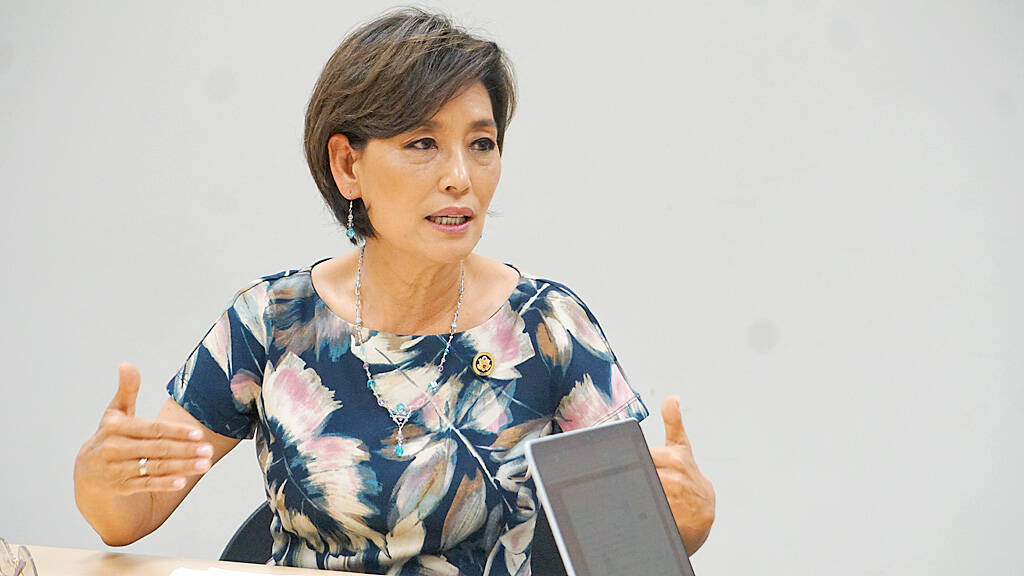Taiwan is critical to the global economy, and its defense is a “here and now” issue, US Representative Young Kim said during a roundtable talk on Taiwan-US relations on Friday.
Kim, who serves on the US House of Representatives’ Foreign Affairs Committee, held a roundtable talk titled “Global Ties, Local Impact: Why Taiwan Matters for California,” at Santiago Canyon College in Orange County, California.
“Despite its small size and long distance from us, Taiwan’s cultural and economic importance is felt across our communities,” Kim said during her opening remarks.

Photo: CNA
Stanford University researcher and lecturer Lanhee Chen (陳仁宜), Certified Public Accountant Harry Lin (林清吉) and US Representative Jay Obernolte also attended the talk.
“Taiwanese have been calling Southern California their home for decades, starting businesses, creating jobs and building strong communities,” Kim said.
“As chairwoman of the [US] House [of Representatives] Foreign Affairs Indo-Pacific Subcommittee, Taiwan has been a focal point of our work,” she said.
Despite being governed democratically by Taiwanese, the nation faces constant economic and military coercion from the Chinese Communist Party, she said.
The Chinese military holds regular drills around the Taiwan Strait, apparently as preparation for a military conflict or blockade of Taiwan, she said.
“Although 7,000 miles [11,265km] away, Taiwan is not an ‘over there’ problem,” she said. “Some estimates suggest that a Chinese invasion of Taiwan would cost the global economy US$10 trillion — a larger impact than the 2008 Great Recession and the COVID-19 pandemic.”
As a high-tech economy, California in particular would be affected negatively by a Chinese invasion of Taiwan, she said, adding that comments by Chinese President Xi Jinping (習近平) suggest such an invasion is possible by as soon as 2027.
Kim said that during a previous visit to Taiwan, she asked a representative of Taiwan Semiconductor Manufacturing Co what would happen if Taiwan were to be blockaded by China, and was told that the global economy would shut down.
Taiwan is the origin of more than 90 percent of the world’s advanced semiconductors, which are used in many products, including mobile phones, TVs, microwave ovens and cars, used daily by US citizens, she said.
“Foreign policy is not something that only concerns Washington DC — it concerns every American,” she said.
Kim said she has expressed support for Taiwan’s participation in international organizations, including the WHO and the IMF, and has urged the US government to ensure that weapons purchased by Taiwan were delivered on time.
Taiwan pays billions of dollars for weapons, which the US must continue to provide it with, according to the stipulations of its Taiwan Relations Act, she said.

A drunk woman was sexually assaulted inside a crowded concourse of Taipei Railway Station on Thursday last week before a foreign tourist notified police, leading to calls for better education on bystander intervention and review of security infrastructure. The man, surnamed Chiu (邱), was taken into custody on charges of sexual assault, taking advantage of the woman’s condition and public indecency. Police discovered that Chiu was a fugitive with prior convictions for vehicle theft. He has been taken into custody and is to complete his unserved six-month sentence, police said. On Thursday last week, Chiu was seen wearing a white

EVA Airways, one of the leading international carriers in Taiwan, yesterday said that it was investigating reports that a cabin crew manager had ignored the condition of a sick flight attendant, who died on Saturday. The airline made the statement in response to a post circulating on social media that said that the flight attendant on an outbound flight was feeling sick and notified the cabin crew manager. Although the flight attendant grew increasingly ill on the return flight, the manager did not contact Medlink — a system that connects the aircraft to doctors on the ground for treatment advice during medical

The Taoyuan Flight Attendants’ Union yesterday vowed to protest at the EVA Air Marathon on Sunday next week should EVA Airway Corp’s management continue to ignore the union’s petition to change rules on employees’ leave of absence system, after a flight attendant reportedly died after working on a long-haul flight while ill. The case has generated public discussion over whether taking personal or sick leave should affect a worker’s performance review. Several union members yesterday protested at the Legislative Yuan, holding white flowers and placards, while shouting: “Life is priceless; requesting leave is not a crime.” “The union is scheduled to meet with

‘UNITED FRONT’ RHETORIC: China’s TAO also plans to hold weekly, instead of biweekly, news conferences because it wants to control the cross-strait discourse, an expert said China’s plan to expand its single-entry visa-on-arrival service to Taiwanese would be of limited interest to Taiwanese and is a feeble attempt by Chinese administrators to demonstrate that they are doing something, the Mainland Affairs Council said yesterday. China’s Taiwan Affairs Office (TAO) spokesman Chen Binhua (陳斌華) said the program aims to facilitate travel to China for Taiwanese compatriots, regardless of whether they are arriving via direct flights or are entering mainland China through Hong Kong, Macau or other countries, and they would be able to apply for a single-entry visa-on-arrival at all eligible entry points in China. The policy aims